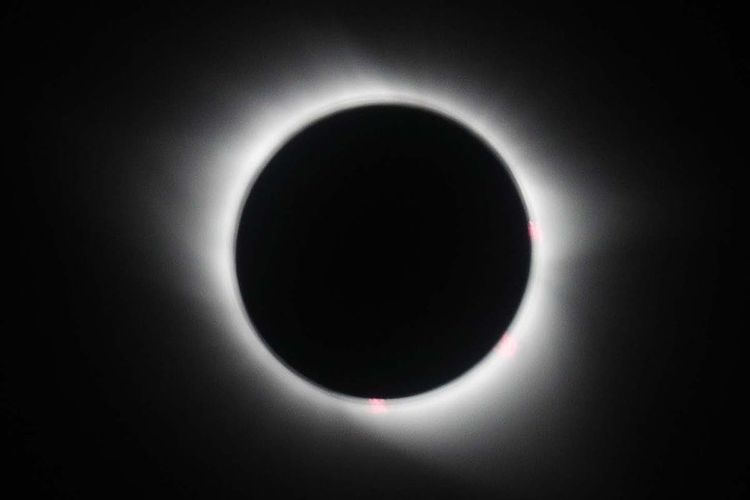Where to see the solar eclipse in the UK — and whether you can in London

A lot of people are excitedly anticipating the complete solar eclipse happening on Monday (April 8th).
However, experts are foreseeing overcast weather in Texas, Oklahoma, and the south of Arkansas, which could imply that the ability to see may not be as great as anticipated.
According to the US National Weather Service, there may be a couple of tornadoes and extremely large hail in the states during the eclipse.
For people residing in New England and some areas of Canada, the chances of witnessing the incredible sight of the meteor shower are higher. This can be attributed to the fact that there are clear skies which will enable watching the event in almost perfect conditions.
Certain regions of the United States are anticipated to experience complete darkness for a duration of four minutes and 28 seconds.
When the moon fully covers the solar disk, a phenomenon called totality will move across the cities of Indianapolis, Cleveland, and Buffalo as it passes through the US Midwest.
Numerous individuals have journeyed to witness the major occasion, shelling out a large sum of money for lodgings several months beforehand. A few are even moving to another location due to the changing weather projection.
Some people are hosting "eclipse celebrations" while a million individuals are anticipated to gather at Niagara Falls. A condition of urgency has been announced on the Canadian portion to allow for additional resources.
What's A Total Eclipse?
A complete solar eclipse occurs when the moon and sun intersect.
The reason why the moon is capable of obstructing the sun's visible surface is due to the fact that the sun may be 400 times larger than the moon, but it's situated about 400 times farther away from Earth. This causes both celestial bodies to appear equal in size when observed from our planet.
When you are positioned in the precise location on Earth at the correct moment, you will witness the perfect merging of the sun and the moon. This spot is referred to by scientists as totality, where the moon eclipses the sun entirely, darkening the sky.
When Is Monday's Eclipse?
The solar eclipse will commence at approximately 11:07 AM within the Pacific coastline of Mexico, which is equivalent to 7:07 PM, UK time. After 20 minutes, it will proceed to Texas in the northeast direction.
On April 8, some areas in the United Kingdom may experience a partial solar eclipse, according to specialists. Residents of Northern Ireland, Scotland, and some parts of Wales and western England may be able to witness the phenomenon, so it's worth keeping a lookout.
According to the BBC, it may be possible to catch a partial eclipse from the western regions of the UK just before sunset.
According to the information presented, if you were to draw a straight line starting from around Fowey in Cornwall and extending up to Berwick-upon-Tweed in Northumberland, then regions situated to the west of this line may observe a partial eclipse of the sun as it sets beyond the horizon.
The UK is set to experience a partial solar eclipse, according to Dr Edward Bloomer, a senior astronomer at the Royal Observatory Greenwich. He explained to Sky News that the eclipse will only be visible in the west and north of the country, and it will only be a minor event.
The partial eclipse will begin at 7:52pm (BST) and will conclude at 8:51pm.
Regrettably, individuals located in London will not be able to witness the spectacle.
Dr. Bloomer expressed disappointment by saying that unfortunately, the regions of the south and east will not be fortunate on this occasion.
"We are a little disappointed that we won't be able to witness anything from the observatory ourselves."
You have the option to tune in to Nasa’s YouTube channel and view real-time footage of the eclipse.
Last Solar Eclipse Date?
The most recent solar eclipse that could be seen from the United Kingdom occurred on June 10, 2021 and it was a partial solar eclipse.
In 1999, the United Kingdom experienced its most recent complete solar eclipse.
What Makes Them So Uncommon?
The website Time and Date has mentioned that the occurrence of solar eclipses can only take place specifically during a new moon phase. This is due to the positioning of Earth, moon, and sun that happens exclusively during that time. It's important to note that this doesn't necessarily imply that every new moon will result in an eclipse of the sun.
Each of the heavenly objects must be positioned in close proximity to a specific point in the moon's orbit, which occurs approximately every half year and persists for an average of 34.5 days.
The lunar nodes are a pair of spots where the orbit of the moon around Earth intersects with the area where Earth orbits around the sun. This intersection is referred to as the ecliptic. On infrequent occasions, the two orbits come together because the moon's journey around Earth is inclined at an angle of about 5° to the ecliptic. Due to these variables, it requires roughly 375 years for a complete solar eclipse to happen again in the very same spot.
Many people only get to experience a total solar eclipse once in their lifetime. Nevertheless, if someone is eager to journey to different countries, they could potentially witness this remarkable phenomenon more than once.













































